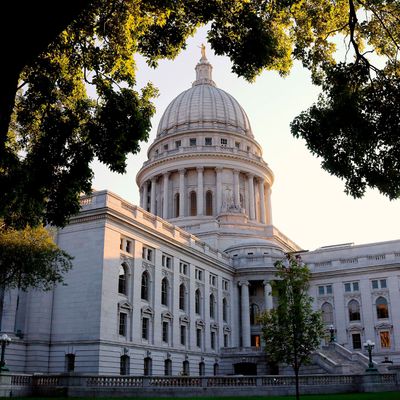
Joe Biden issued a warning to the country Thursday night about the lengths Donald Trump might go to in order to hang onto the presidency, as Katie Gleuck reported:
“Mark my words, I think he is going to try to kick back the election somehow, come up with some rationale why it can’t be held,” Mr. Biden said at a fund-raiser, according to a news media pool report. Mr. Trump, he suggested, is “trying to let the word out that he’s going to do all he can to make it very hard for people to vote. That’s the only way he thinks he can possibly win.”
Team Trump responded, its usual measured and civil manner:
“Those are the incoherent, conspiracy theory ramblings of a lost candidate who is out of touch with reality,” Tim Murtaugh, communications director for Mr. Trump’s re-election campaign, said in a statement.
And a Republican National Committee spokesman, Steve Guest, called Mr. Biden’s comments “an irresponsible allegation,” adding that “President Trump has made it clear that the general election will happen on November 3rd.”
Actually, he probably doesn’t have much choice in the manner, since barring an invocation of the Insurrection Act and an unlikely positive reaction by the courts, Trump has no real power to move Election Day from its constitutional moorings. And if he tried to stay in office for an extended period of time, he’d run afoul of the end of his term in January 2021. Presumably Biden’s just underlining Trump’s erratic and lawless nature, and it’s a good thing to get the incumbent on record as often as possible ruling out banana republic tactics.
But there’s another more realistic, if still far-fetched, scenario that Democrats should start talking about in order to smoke out and perhaps snuff out evil intentions: one in which state legislatures usurp voters’s prerogatives after a disputed election and y directly appoint presidential electors. Unlike moving Election Day, there’s a constitutional sanction for that gambit, as political scientist David Schultz observed:
Article II, Section 1, Paragraph 2 entrusts to state legislatures the authority to select the presidential electors. As the Supreme Court reminded America in Bush v. Gore: The “individual citizen has no federal constitutional right to vote for electors for the President of the United States unless and until the state legislature chooses a statewide election as the means to implement its power to appoint members of the Electoral College.”
Speaking of Bush v. Gore, Florida’s Republican legislators came very close to naming electors pledged to George W. Bush during the 2000 election dispute, until the Supreme Court made it all moot by awarding the election to W. via an order to stop recounts. Ron Brownstein explained it at the time:
Amid rising partisan tensions, the Republican majority in the Florida Legislature moved closer Monday toward an unprecedented effort to directly award the state’s 25 electoral votes to George W. Bush.
No state legislature has ever voted to authorize a slate of electors to compete with those chosen in a popular vote.
But in a brief they jointly filed with the U.S. Supreme Court on Monday, the Florida Senate and House aggressively claimed the constitutional power to do just that.
The Florida legislature claimed that court disputes over the Bush-Gore presidential contest had made it impossible to name electors “in a timely manner,” and also that recounts had illegally changed election rules after the fact. Its arguments were never tested in federal court, but were indirectly validated by SCOTUS. So consider this scenario: After a close election and a long count (lengthened by high levels of mail ballots), with court orders and lawsuits flying through the air, one or two or three unresolved states are in a position to give Trump 270 electoral votes, and Republican-controlled legislatures announce they are intervening (much as Florida’s did in 2000) to avoid chaos and “election fraud” and even civil war. No fewer than seven key battlegrounds states (Arizona, Florida, Georgia, Michigan, North Carolina, Pennsylvania and Wisconsin) have Republican-controlled legislature.
Now in this extreme scenario, could a Democratic Governor (as Michigan, Pennsylvania and Wisconsin have) veto a legislative gambit to appoint electors? That’s a murky question. If the electors are appointed by joint legislative resolution, typically governors have no power to veto such measures, and in addition, governors in North Carolina and Wisconsin have limited veto powers. Suffice it to say that any legislature moving in this direction would trigger a state, and then federal, court battle, with the whole conflict likely winding up in the U.S. Supreme Court.
Isn’t that reassuring!






























